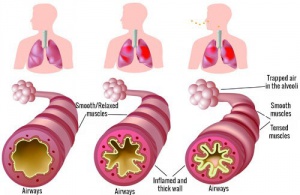What to Do if You Suffer from Chronic Asthma or Allergies

Unfortunately, chronic asthma and allergies are two very common medical conditions today.
Actually, the problem is that these conditions are often directly related. Plus, they both can greatly affect the lives of those who suffer from them.
However, it’s always possible to try different natural treatments that can greatly help asthmatics and people with allergies.
If you would like to know a bit more about these therapeutic resources for chronic asthma and allergies, then keep reading.

Read: Natural Remedies for Seasonal Allergies
Chronic Asthma and Allergies…Combined?
Believe it or not, the same substances that unleash hay fever can also cause signs and symptoms of asthma, like difficulty breathing, wheezing, and chest tightness. This is known as allergic asthma, or allergy-induced asthma.
Certain substances, like pollen, dust mites, and pet dander are common triggers. In addition, skin or food allergies can also cause asthma symptoms in some people.

How do Allergic Reactions cause Asthmatic Symptoms?
An allergic reactions is created when the body’s immune system proteins incorrectly identify an inoffensive substance, like pollen, as an invader. Then, in an attempt to protect the body from said substance, the antibodies latch on to the allergen.
The chemical substances the immune system releases create the allergy’s signs and symptoms. Overall, these include nasal congestion, itchy eye, or skin reactions. For some people, this same reaction also affects the lungs and airways, provoking asthmatic symptoms.
Natural Remedies to Help
Next, let’s take a look at a list of some of the things that can help with chronic asthma and allergies:
- First, it’s very important to reduce airways spasms. Magnesium is well known for alleviating muscular spasms, including the muscles that surround airways in the lungs.
- In addition, green tea is also an efficient bronchodilator that’s easy to use.
- If you suffer from chronic asthma and allergies, you absolutely must learn to balance your body’s allergic tract. Omega-3 oils, found in linseed and fish, can be a very effective way to do so. A study found that children who eat fish more than once a week have one third the risk of developing asthma than children who do not eat fish regularly.
- Next, avoid artificial coloring, preservatives, aspirin and ibuprofin, and other non-steroid anti-inflammatory medications. These substances promote leukotriene production. This is a potent inflammatory substances that increases asthma.
- Finally, a lot of asthmatics do not produce enough stomach acid. Thus, this can cause food allergies, and a decrease in nutrient absorption. Chlorhydric acid supplements can help with this.
However, this information should never replace medications that your doctor recommends. Remember, it’s always important to consult a medical specialist regarding your condition.
Overall, with medical supervision, and with a combination of a few natural remedies, it’s possible to reduce your medication.
All cited sources were thoroughly reviewed by our team to ensure their quality, reliability, currency, and validity. The bibliography of this article was considered reliable and of academic or scientific accuracy.
- Linares Borges A, Rodríguez Muñiz J, Betancourt B, Alemán Aguiar H, Jiménez Hernández L, Chala Tadrón J. Efecto clínico de una formulación de teofilina de liberación sostenida en asmáticos moderados o severos con intercrisis. Revista Alergia México 2000; 42 (2): 64-68. Available at: https://www.researchgate.net/publication/289061294_Efecto_clinico_de_una_formulacion_de_teofilina_de_liberacion_sostenida_en_pacientes_asmaticos_moderados_o_severos_con_intercrisis. Accessed 01/17, 2019.
- Tovar-Peña O, Varela-Martínez C. Estudio comparativo de la eficacia del sulfato de magnesio o de la aminofilina adicionados a la terapia convencional en el tratamiento de pacientes con crisis asmática severa. Revista Médica de los Postgrados de Medicina 2002; 7 (3). Available at: http://65.182.2.244/RMP/pdf/2002/pdf/Vol7-3-2002-4.pdf. Accessed 01/17, 2019.
- Valenzuela R, Tapia G, González M, Valenzuela A. Ácidos grasos omega-3 (EPA y DHA) y su aplicación en diversas situaciones clínicas. Revista chilena de nutrición 2011; 38 (3): 356-367. Available at: https://scielo.conicyt.cl/scielo.php?pid=S0717-75182011000300011&script=sci_arttext. Accessed 01/17, 2019.
This text is provided for informational purposes only and does not replace consultation with a professional. If in doubt, consult your specialist.








